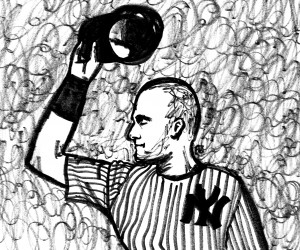Derek Jeter ; now that’s a name that can make even non-sports fans smile. Jeter played in the biggest city in the country and probably under the most scrutiny of any athlete. Despite all the public pressure and little room for success, he has never been the center of controversy during his 20 years in professional baseball.
If that doesn’t impress you, Mr. November also has five World Series rings on his hand, not to mention 3,450 hits in his career. That’s good enough to put him at sixth place on the all-time hits list. Let me stress that point: all-time. Jeter has shown tremendous leadership in the most successful franchise in baseball, providing a source of stability for the New York Yankees, a team with several big-name players coming in and going out.
Jeter also spends a substantial amount of time supporting his own Turn 2 Foundation, an organization working to “motivate young people to turn away from drugs and alcohol and ‘TURN 2’ healthy lifestyles… [and to] promote academic excellence, leadership development, and positive behavior.” Jeter sets a fantastic example for the community and wants this message to resonate with younger generations.
Whether it be the signature 360° throw in the field, giving up his body to make an out, hitting a walk-off homerun in November, saving the team with an intense flip play to home plate, getting hit number 3,000 with a walk-off homerun, or hitting a walk-off single in his final at-bat at home, Derek Jeter has an almost infinite list of memorable moments.
There have been some critics, however. Keith Olbermann, a sports analyst, has come out criticizing Jeter. His two main arguments against Derek are that he has never won an MVP and that his wins above replacement (WAR) is not even on the Yankees’ all-time top ten.
In terms of the MVP, Olbermann subjectively values homeruns and RBI’s over hits and average. These are far flashier statistics, and it makes sense that the most dominant hitter in the league would seem, on the surface, to be the one batting in runs. Derek just isn’t that player. This might not make him the best player in baseball in a given season. However, he has hit a .310 average throughout his career. It’s natural that he wouldn’t bat in many runs, since he batted at the top of the order. Jeter was arguably the best baseball player in the more than 20 years he played, because he consistently hit at close to the top of the league, in terms of average and even on-base percentage year after year.
With WAR, the issue is again the subjective way in which we determine a player’s value. WAR looks at “Batting Runs” and “Fielding Runs.” Jeter’s fielding ability has been slightly above average throughout his career, winning five Gold Glove awards. However, since he batted at the top of the Yankees lineup, his “Batting Runs” were lacking. In that position in the lineup, Derek had fewer opportunities to drive in runners. Because of this, WAR actually undervalues Jeter in comparison to other players who batted in the middle of the lineup.
The seasons Derek played at ages 39 and 40 were certainly nothing to be impressed with. He had career lows in hits, average, homeruns, on-base percentage, runs batted in, and slugging percentage. This is natural, though; all players regress at the tail-end of their careers. Even the greats like Babe Ruth, Lou Gehrig, and Joe Dimaggio slid in their last seasons and to an even greater extent than Jeter did. We shouldn’t let two average seasons cloud our judgment of a player who has been great throughout his career.
DJ is certainly a First Ballot Hall of Famer and will be known as one of the greatest Yankees of all time. He’ll definitely be celebrated for his leadership and ability to handle his stressful position.
In the end of his domain, all I can say is: “Thank you, Derek.”
Upadhya is a member of the class of 2017.






